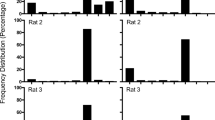Abstract
Two hooded rats were reinforced on variable-interval schedules of reinforcement on each of two concurrently available response levers. When responding on one lever was punished by time-out from positive reinforcement (retraction of both levers), responding on the punished lever was suppressed and rate of responding on the unpunished lever increased. The preference for the unpunished lever persisted when the variable-interval schedule of reinforcement on this lever was adjusted to relatively lower levels than that on the punished lever. The results favored the view that time-out functioned as an aversive stimulus in this context.
Similar content being viewed by others
References
FERSTER, C. B. 1958. Control of behavior in chimpanzees and pigeons by time-out from positive reinforcement. Psychological Monography., 72, (8, Whole No. 461).
HOLZ, W. C., AZRIN, N. H., & AYLLON, T. 1963. Elimination of behavior of mental patients by response-produced extinction. Journal of the Experimental Analysis of Behavior., 6, 407–412.
KAUFMAN, A., & BARON, A. 1966. Use of withdrawal of reinforcement within the escape-avoidance paradigm. Psychological Repor., 19, 959–965.
LEITENBERG, H. 1965. Is time-out from positive reinforcement an aversive event? A review of the experimental evidence. Psychological Bullet., 64, 428–441.
MCMILLAN, D. E. 1967. A comparison of the punishing effects of response-produced shock and response-produced time out. Journal of the Experimental Analysis of behaviour., 10, 439–449.
MECHNER, F., & RAY, R. 1959. Avoidance of time-out from fixed-interval reinforcement. Journal of the Experimental Analysis of Behavior., 2, 261.
REYNOLDS, G. S. 1961. Behavioral contrast. Journal of the Experimental Analysis of Behavior., 1966. 4, 57–71.
TERRACE, H.S. 1966. Stimulus control. In W. K. Honig (Ed.), Operant behavior: Areas of research and applicatio. New York: Appleton-Century. pp. 272–344.
Author information
Authors and Affiliations
Additional information
This research was supported by Biomedical Sciences and Intramural Research Grants from the University of Hawaii Research Council to the first author.
Rights and permissions
About this article
Cite this article
Carlson, J.G., Aroksaar, R.E. Effects of Time-Out Upon Concurrent Operant Responding. Psychol Rec 20, 365–371 (1970). https://doi.org/10.1007/BF03393954
Published:
Issue Date:
DOI: https://doi.org/10.1007/BF03393954




